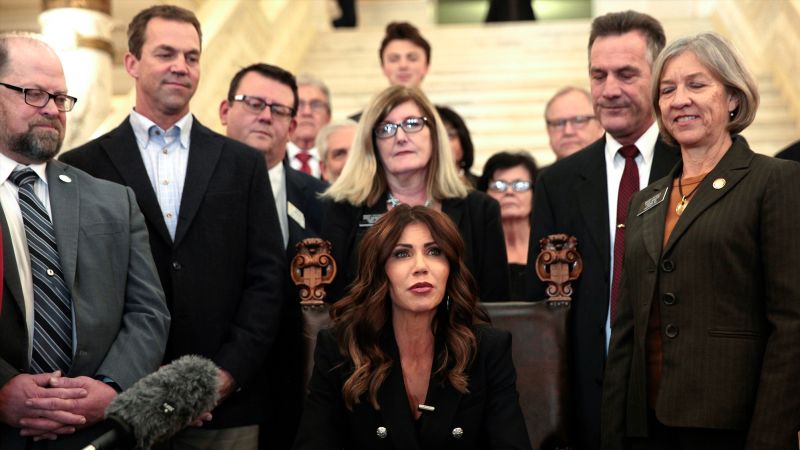

CNN
—
South Dakota Republican Gov. Kristi Noem on Monday signed a bill into law that will ban both surgical and non-surgical gender-affirming treatments for transgender minors in the state.
HB 1080 outlaws the prescription and administration of puberty-blocking medication in patients under the age of 18, as well as sex hormones and surgery related to gender transition. Health care providers who violate the new law, which takes effect on July 1, risk civil suits and losing their professional or occupational licenses.
“South Dakota’s kids are our future. With this legislation, we are protecting kids from harmful, permanent medical procedures,” Noem said in a news release Monday. “I will always stand up for the next generation of South Dakotans.”
Noem’s signature comes on the heels of the state’s push last year to ban transgender girls and women from playing on school sports teams that correspond with their gender identity and makes South Dakota just the latest Republican-led state to restrict trans minors’ access to gender-affirming treatments.
The state Senate voted 30-4 on Thursday to send the bill to the governor, after the state House had advanced it in a 60-10 vote earlier this month.
Gender-affirming care is medically necessary, evidence-based care that uses a multidisciplinary approach to help a person transition from their assigned gender – the one the person was designated at birth – to their affirmed gender – the gender by which one wants to be known.
The bill’s Senate sponsor, Al Novstrup, argued Thursday that the legislation is a way to provide “meaningful help.”
“We care deeply about children who are struggling with their identities and want to provide them with true meaningful help, not permanent physical damage,” the Republican said.
Although both Noem and Novstrup warned against “permanent” changes, treatment banned under the law is not entirely permanent.
Though gender-affirming care is highly individualized, some children may decide to use reversible puberty suppression therapy. This part of the process may also include hormone therapy that can lead to gender-affirming physical change. Surgical interventions, however, are not typically done on children and many health care providers do not offer them to minors.
Opponents of the bill emphasized that the measure would be harmful to transgender children and was a government intrusion into medical decisions.
“Surgeries-gone-wrong are simply not happening in South Dakota,” Democratic state Sen. Liz Larson said during debate prior to the bill’s passage. “I don’t know about you, but I don’t need the state legislature when I’m in the doctor’s office.”
The Trevor Project said in a statement Monday that the ban “denies transgender and nonbinary youth crucial support and care.”
“Even in the face of professional guidance from every major medical and mental health association in the country that supports this type of care, politicians are intruding into the private medical decisions best left to transgender young people and their families,” said Casey Pick, director of law and policy for the non-profit advocating for the mental health of LGBTQ youth.
The American Civil Liberties Union and the ACLU of South Dakota also issued a statement Monday condemning the new law, calling the signing a “heartbreaking and tragic day for thousands of South Dakotans and their families.”
“This ban won’t stop South Dakotans from being trans, but it will deny them critical support that helps struggling transgender youth grow up to become thriving transgender adults,” the statement said. “As much as Governor Noem wants to force these young people to live a lie, we know they are strong enough to live their truth, and we will always fight for communities and policies that protect their freedom to do so.”
South Dakota is the second state in recent weeks to put restrictions on gender-affirming care for trans minors, after several states took action in 2022.
Late last month, Utah Republican Gov. Spencer Cox signed a bill that bans hormone treatment and surgical procedures for minors who want gender-affirming care.
The Florida Department of Health, meanwhile, said last April that children who identify as transgender or gender diverse should not be offered any social transition care, while Alabama earlier that same month passed a law making it a felony for doctors to administer gender-affirming care for minors.
The number of states with bans could continue to grow this year. More than 80 bills seeking to restrict access to gender-affirming care have been introduced around the country through February 9, according to data compiled by the ACLU and shared with CNN.
This story has been updated with additional information.
